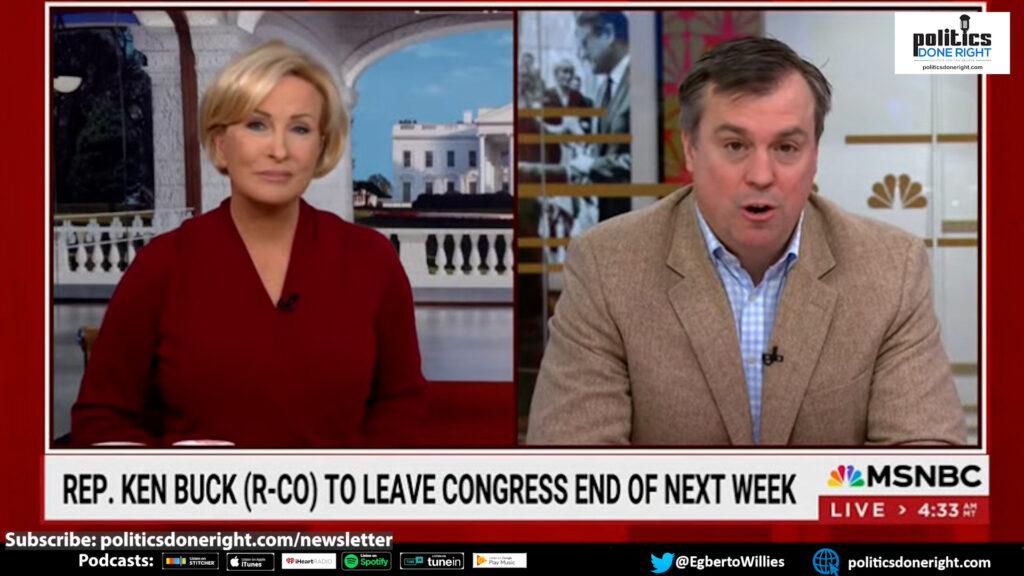Ken Buck (R-CO), a former TEA Party candidate, can no longer coexist with MAGA, so he quit. Listen to his reasons.
A Tea Party Republican quits MAGA Congress.
Podcasts (Video — Audio)
The resignation of Colorado Republican Congressman Ken Buck has emerged as a poignant illustration of the internal tumult shaking the foundations of the Republican Party. His decision to depart Congress announced with a tone of frustration and disillusionment, underscores a broader narrative of ideological schisms and radical shifts within the party, particularly between its traditional conservative base and the more recent, fervently extreme MAGA faction.
Ken Buck, who initially rode the wave of the Tea Party movement into political relevance, represents a faction within the Republican Party that, while conservative, now finds itself at odds with the rising tide of MAGA extremism. The Tea Party once considered the epitome of conservative radicalism, pales in comparison to the fervor and divisive tactics employed by MAGA proponents. Buck’s departure signals not only his personal discontent but also serves as a microcosm of a party grappling with its identity in the face of escalating extremism.
The gravity of Buck’s resignation lies not merely in his leaving but in its broader implications for the Republican Party and American politics. His departure further narrows the already slim majority the Republicans hold in Congress, highlighting the tangible impacts of internal discord on the party’s legislative capabilities. More significantly, it illuminates the struggle for the Republican Party’s soul, a battle between its past and its increasingly radical future.
Buck’s critique of the current state of Congress, and by extension his party, touches on a disillusionment with the politicization and weaponization of processes like impeachment, which he argues have been reduced to social media fodder rather than treated as serious constitutional procedures. This critique speaks volumes about the transformation of political discourse and governance from a focus on policy and ideological differences to one dominated by spectacle, sensationalism, and an often destructive pursuit of power.
The shockwaves of Buck’s resignation have resonated within the Republican leadership, catching figures like Speaker Johnson and Steve Scalise off guard. This element of surprise adds to the narrative of a party in disarray, struggling to navigate the tumultuous waters of its internal divisions. The reaction from the party’s leadership underscores a lack of unity and communication within its ranks, further complicating its ability to govern effectively.
The shift from Tea Party conservatism to MAGA extremism represents more than just a change in rhetoric or policy priorities; it signifies a fundamental transformation like political engagement and discourse within the Republican Party. The MAGA movement, with its emphasis on populist, often divisive and exclusionary policies, marks a departure from traditional conservative principles, favoring instead a more combative, confrontational approach to politics.
This transition has profound implications for the future of American democracy. It raises questions about the sustainability of political institutions and norms in the face of growing extremism and polarization. The departure of figures like Buck, who represents a bridge between traditional conservatism and the present, may signal the dwindling of a moderating influence within the Republican Party, paving the way for more extreme elements to dominate.
Ken Buck’s resignation from Congress is more than just a personal decision; it reflects the broader challenges and shifts within the Republican Party and American politics. It serves as a warning of the dangers posed by increasing extremism and the erosion of political norms. As the Republican Party navigates its identity crisis, the lessons of Buck’s departure should not be ignored. The future of the party, and potentially American democracy, may well depend on its ability to reconcile its internal divisions and embrace a more inclusive, less divisive vision of governance.
Viewers are encouraged to subscribe and join the conversation for more insightful commentary and to support progressive messages. Together, we can populate the internet with progressive messages that represent the true aspirations of most Americans.

